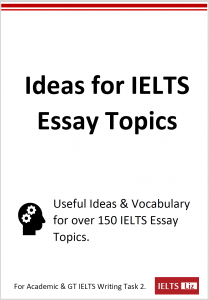Learn why the IELTS speaking examiner might interrupt your answer in the IELTS Speaking Test. A lot of IELTS candidates are shocked that the examiner stops them in the middle of their answer to ask a new question. They are not prepared for interruptions and when it happens, they lose focus, get stressed and their performance suffers. Don’t let this happen to you. Be prepared and understand why the examiner is interrupting your answer.
Why the IELTS speaking examiner interrupts your answer
There are three main reasons why the IELTS speaking examiner might interrupt you and not let you finish your answer.
- The main reason is that time is limited. If your answer is slow, lengthy or not giving enough good English, the examiner might choose to stop you and start with a fresh question. It’s one way that the examiner can help guide you and keep you on track.
- Another reason is that you already gave the examiner the aspect of language they wanted to hear. When this happens, the examiner doesn’t need to hear the rest of your answer and can interrupt you to move on. Let me give you an example:
- Question: What changes would you make to your home if you could?
- Answer: If I could, I’d expand the living room so that we have more space and maybe build a patio. But I’d also like to ….
- Comments: Why would the examiner stop the answer after only one sentence? Well, this question was testing if the candidate could speak in the hypothetical tense (second conditional). The candidate already showed that this tense was easy for them, so the examiner can stop them and move on to a new question. Remember, some questions are testing specific language functions and once you’ve shown that ability in your answer, the examiner could stop you so that they can test other aspects of your language.
- The examiner will also interrupt you if time is up in any part of the test. This is actually obligatory.
It is important that you understand this fully:
- The IELTS speaking examiner is not being rude or lacking concentration by interrupting you. In fact, when they change questions, they usually have a valid reason for doing so, which is neither bad or good as far as you are concerned.
- The examiner is not trying to undermine your confidence. You actually should be prepared for interruptions to your answers if you have prepared fully for the test. This aspect of the IELTS speaking test should not be a surprise to you.
- Being off topic does not affect your score in IELTS speaking. So, when the examiner interrupts you to redirect the question, it won’t affect your score. It is the examiner helping you.
- The examiner isn’t interrupting you because you gave the wrong answer. There are no right or wrong answers – only opportunities to showcase your English. Interrupting your answer gives you a chance to tackle a new question.
- The examiner does not rapidly ask questions to test your ability to handle stress – this is not how the IELTS speaking test works. The examiner only has a certain amount of time to test your English thoroughly so that they can give you a fair and valid score. Often you might show a wider range of English when you are given more different questions and topics.
- Each examiner is different. Some examiners do tend to interrupt more than others so always be prepared. Whether they interrupt a lot or not at all doesn’t mean one examiner is better than another.
Always remember that the examiner is only testing 4 things: fluency, vocab, grammar and pronunciation. Nothing else is marked.
Will interruption to your answer lower your score?
No. 100% not. This is a choice made by the examiner to cover all language functions and direct the test in the way the examiner wants.
How Can you Prepare and Cope for Interruptions
- You should know that the IELTS speaking examiner might interrupt you before you enter the test room. This is knowledge about the test that you ought to learn during your exam preparation.
- When it happens, don’t be upset or confused.
- Being interrupted isn’t bad or good. It’s just part of the testing system and will help the examiner assess many parts of your language.
- Don’t think you made a mistake. The examiner might be moving on because your answer was actually excellent already. For whatever reason, it is simply a way for the examiner to manage the test and you don’t need to be concerned about it.
- Keep talking until you are interrupted. Let the examiner manage the test their way.
- As soon as you are interrupted, focus on the new question.
- Regardless of interruptions, be confident and try to enjoy the test. It is an informal speaking test.
- Remember, interruptions are normal.
Free IELTS Speaking Tips & Model Answers
Click here to learn more about IELTS Speaking for free: IELTS Speaking Tips & Answers
……………………….
Subscribe to get new posts for free in your inbox





